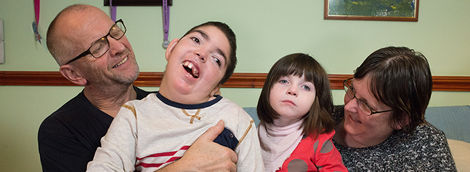Epilepsy case study
Ellie's story

Ellie was diagnosed with refractory epilepsy when she was just three years old.
She was having up to 50 seizures every day. The high frequency of seizures had a huge impact on life at home for Ellie and her family. It also affected her development at this early stage. She was referred to a paediatric neurologist who started her on standard anti-epileptic drug (AED) therapy. But mum felt that the drugs were making Ellie lethargic, and disinterested in engaging with anyone.
After trying three AEDs at maximum doses for her age and weight, Ellie’s neurologist proposed a different approach to managing her condition: a ketogenic diet. Switching to this high fat, low carb, adequate protein diet has been shown to have a really positive effect on people with drug-resistant epilepsy.1-5 Ellie was referred to the local tertiary paediatric epilepsy centre so she could get started.
There, Ellie saw a multi-disciplinary team: a paediatric neurologist, a specialist dietitian and a specialist nurse. She started the ketogenic diet gradually over a week. The family received a lot of support from the local dietitian, who liased with the specialist ketogenic dietitian regularly.

Support from Nutricia
Ellie is used to getting her nutrition through a feeding tube. The team put together a regime using Nutricia products, and mum learned how to mix it to the right concentration.
Ellie’s mum initially had trouble with obtaining the prescribed products, but Nutricia delivered it directly to her at home. This made it easier to plan ahead for Ellie’s needs when she went to school or attended hospital.

"Now she is off most of her medication and is seizure free"
Real success
After a few months, Mum noticed that Ellie was more alert and responsive, with better speech and mobility. She was able to learn new skills like swimming and cycling. Her teachers have all commented on how Ellie has met her set goals. Mum is delighted to see a better quality of life for Ellie, and reports that Ellie discontinued the diet in February 2016.
"Since Ellie has been on a ketogenic diet, I feel I have got my girl back"
Disclaimer: Nutricia products are foods for special medical purposes and should only be used under medical supervision.
- Freeman J et al. The ketogenic diet: a treatment for epilepsy in children and others. 2007. 4th ed. Demos, New York
- or epilepsy in children and others. 2007. 4th ed. Demos, New York
- Keene DL. Ped Neurol. 2006;35(1):1-3
- Henderson GB et al. J Child Neurol 2006;21 (3):193-198
- Kossoff EH et al. Epilepsia 2009:febr50(2)304-317
You may also be interested in
Help us provide information most relevant to you
Please ensure your role and areas of interest are up to date.
